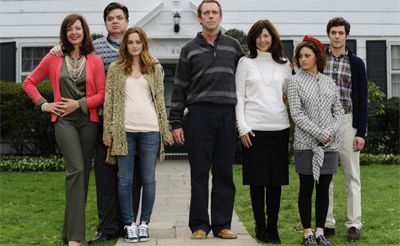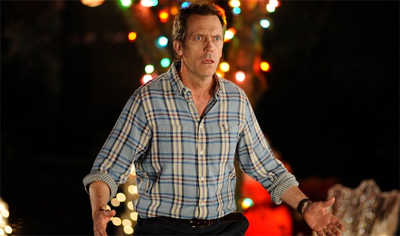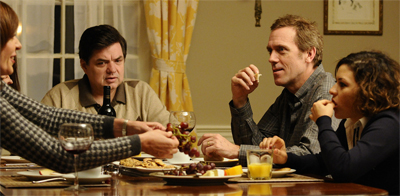There’s an interesting film in here, somewhere. The Oranges teases the possibility of brutally exposing the seedy underside of suburban life, as we follow an affair between a married man and his best friend’s daughter, but The Oranges is far too shallow to land anything resembling a killing stroke. The adult cast is composed of talented veterans, but the script doesn’t give them much to do – instead The Oranges treats their children as the focal point, misjudging the talent of young actresses Leighton Meester and Alia Shawkat. It all feels too light, too cosy, and too willing to pick the low-hanging fruit to really create an interesting study of life in the ‘burbs.

Keeping it in the family…
On one level, The Oranges is far too bitter to swallow easily. The characters are all relatively shallow, which means they aren’t interesting enough for us to care about as they spent the bones of the ninety-minute runtime locked in passive aggressive combat and self-entitled delusion. By the time that one of the characters finally has enough and finally lashes out at the person who hurt them, it’s hard not to sigh in relief. It comes a little bit too late, but the sight of a car careening through a suburban garden packed with gaudy festive decorations invests a bit of energy in the film that had been so sorely lacking.
More than that, though, The Oranges lacks the courage of its convictions. Characters opine about “happiness” and what that means to them and whether it’s important in the grand scheme of things. Such happiness comes at a cost, as we are repeatedly informed, and various cast members are accused of (and confess to being) selfish in their pursuit of their own interests, regardless of the collateral damage caused in their quest for self-fulfilment.

Forbidden fruit…
Despite that, The Oranges lacks teeth, though, and it resolves absolutely everything in the neatest manner possible. “Some day I may even be able to thank you,” one character remarks to the person who ruined their life, at the climax of the film, but it doesn’t feel earned. The Oranges teases tough questions about happiness and individual needs, but it only offers easy answers. Indeed, one character inevitably finds comfort in rejecting their materialist existence for a life of charitably helping others in the most extreme manner possible.
It doesn’t help that this character is introduced to this way of life by a sanctimonious jackass who makes a cheap shot at the “Baby Gap” bag the character is holding. The rest of the movie asks to accept the charity work as sincere and genuine, but the introduction is one of the worst moments in the film – embodying a lot of the flaws with the movie as a whole. It’s on-the-nose, it’s sanctimonious and it’s just incredibly arrogant. It states opinion as fact, offering an easy way out while condescending to the audience.

Hugh know what Hugh did…
It would help if The Oranges had the guts to put its money where its mouth is. It hints throughout the film about rampant consumerism. David got Terry a subscription to Consumer Review for Christmas. David deals with the collapse of his family be putting extra attention into his Christmas decorations. Paige strikes back at David by booking every room in her bed and breakfast. Terry longs for a giant inflatable snow globe. David makes money, as another character puts it, by pushing alcohol on children. (He seems to work as some sort of cool hunter, importing fancy alcoholic beverages from the around the world for personal research.)
However, there’s no punch to any of this. One character eventually opts out of the lifestyle completely, but in the most trite and stereotypical manner imaginable. At the end of the film, Terry is still investing in his “toys” and is all the happier for it. The Oranges teases the possibility that the characters’ sense of entitlement comes from being surrounded by that sort of affluence and wealth, to the point where David can afford a fully kitted-out “mancave”, but it never really deals with it. Instead, the climax of the movie just sort of wimps out on it.

Family fun…
It’s a shame, because there’s a pretty stellar cast here. Oliver Platt and Catherine Keener did this sort of thing quite recently (and to better effect) in Please Give, but both give good performances. Platt in particular manages to generate more than his fair share of laughs playing the bumbling member of the quartet. Alison Janney is always great fun, and she does the best she can with the material. Hugh Laurie, on the other hand, is strangled by the fact that the film is never really interested in David as a character in his own right. He seems to exist to provoke everybody else, with no real indication of what is going on inside his head. Laurie tries his best, but the film doesn’t give him the material.
For some reason, The Oranges decides to focus on the children of the two families, Nina and Vanessa. Leighton Meester doesn’t make much of an impression as Nina, which is a problem – as the film hinges on her character. However, Meester does better work than Alia Shawkat. The movie gives a lot of narration to Vanessa, which indicates some storytelling issues, but the character is really difficult to engage with. She’s not funny, she’s not deep, she’s not insightful. She just sort of is. Shawkat isn’t given a lot to work with, but she can’t seem to give us a reason to care about Vanessa, who is mostly a passive observer of the drama. And yet, despite being entirely passive, she still eats up an inordinate amount of time. Well, at least they are both better than Sam Rosen as Nina’s ex-boyfriend.

Not enough drive…
The production itself is sadly clunky. The carols sound quite good, but the music by Klaus Badelt & Andrew Raiher occasionally threatens to suffocate the film. The direction by Julian Farino is less than inspired, choosing to play every scene for clunky melodrama. It feels like a massive waste, but I don’t envy a director trying to fashion Ian Helfer & Jay Reiss’ screenplay into something coherent and engaging.
The Oranges feels like it should have been a better movie. Instead, it’s just a mess.
Filed under: Non-Review Reviews | Tagged: Alia Shawkat, Catherine Keener, christmas, Conditions and Diseases, David, film, Food, Fruit, Health, hugh laurie, Leighton Meester, Movie, Neurological Disorders, non-review review, oliver platt, oranges, review, stroke, United States |




















Leave a comment